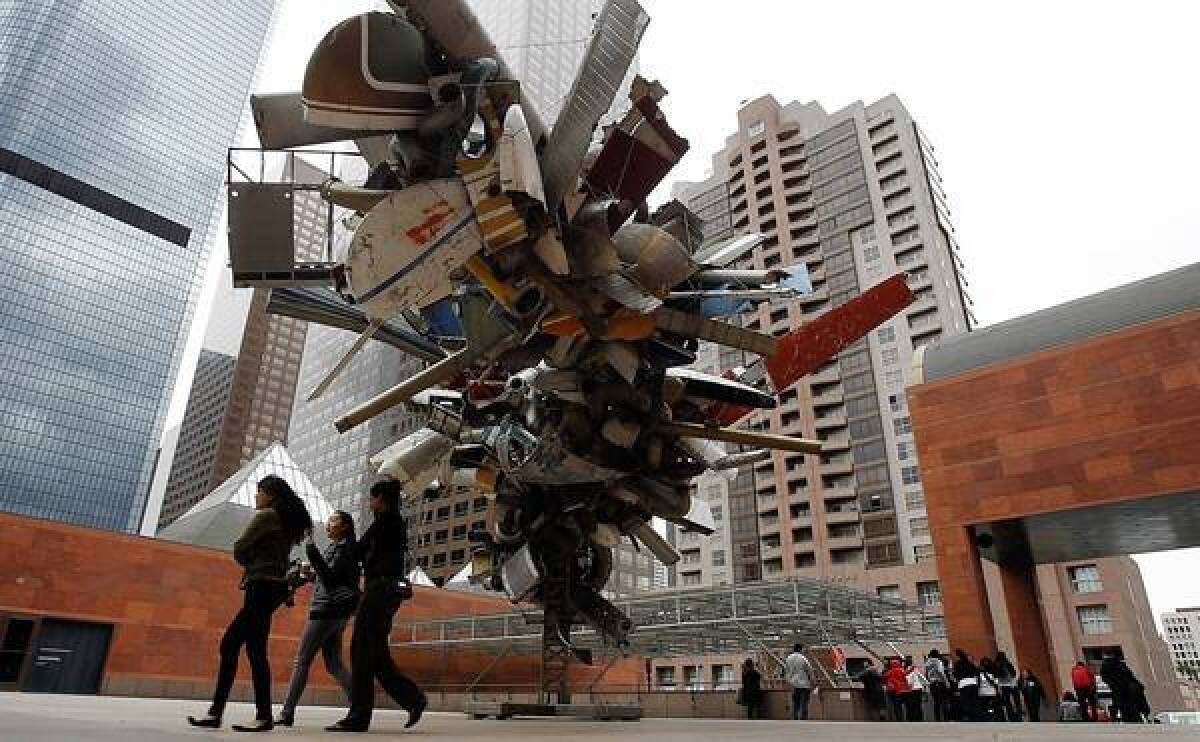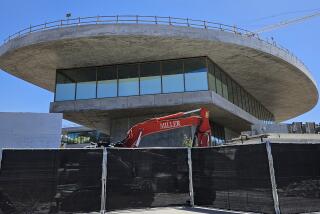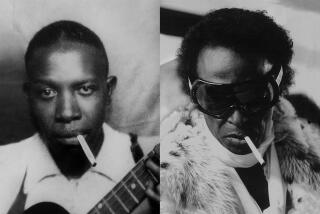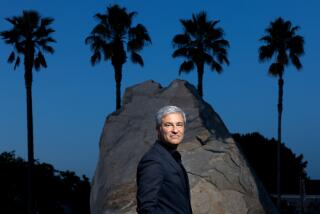A post-Deitch MOCA presents major challenge for next director

The house of MOCA is a real fixer-upper. And that could be a problem as the museum seeks a new director to replace Jeffrey Deitch.
Many museum experts wonder who would be willing to take Deitch’s place at the helm of the troubled institution, given the museum board’s track record of turmoil, MOCA’s shaky finances and its sparse curatorial staff. Its 2012-13 budget was the museum’s lowest in 15 years.
“I don’t think anybody’s gonna take the job until MOCA’s situation is far clearer,” says former Getty Museum Director John Walsh. “Candidates are going to be looking for a board that’s well organized, has achieved its financial goal and is together on what kind of place they stand for. I trust the board will not hit the gas, but hit the brakes. Because this is a very big moment.”
GRAPHIC: MOCA’s ups and downs with Jeffrey Deitch
Some think that the search could be complicated by the involvement of billionaire Eli Broad, the museum board’s founding chairman and life trustee and its biggest donor. He played a major role in bringing Deitch to Los Angeles three years ago.
“Whoever they get to replace Jeffrey Deitch will need to have an absolute guarantee of complete curatorial freedom to do the shows they want, when they want,” says former Museum of Contemporary Art board member and art collector Dean Valentine, who currently serves on an advisory board of Los Angeles’ Hammer Museum.
“Until Eli Broad comes to a recognition that he needs to stay away from the museum in anything other than a financial capacity,” he says, “and until the board begins to behave responsibly and financially support the director, then a new director won’t have the tools to revive this amazing institution.”
Broad did not respond to a request for a comment.
MOCA announced on Wednesday that Deitch, a former New York art gallery owner, would be stepping down following a stormy tenure. Supporters say he helped MOCA revitalize its shows and try new things, while critics say he was unprepared for the administrative and fundraising duties of the job.
MOCA’s search committee to find Deitch’s replacement will be led by board co-chairs Maria Bell and David Johnson as well as former Los Angeles City Councilman Joel Wachs, a former MOCA trustee who is now president of New York’s Andy Warhol Foundation for the Visual Arts.
Carol Weisman, a fundraising expert and president of BoardBuilders.com, says the museum’s most pressing need is to raise money.
“I don’t think you need someone from the arts at all,” Weisman says. “If I had my choice of someone who was an arts expert versus someone not in the arts world who’d raised 100 or 200 million, I’d go with the one who brought the money. Great fundraisers listen well and can tap into what people really care about. They can learn the art part.”
But an ability to raise money alone isn’t enough, says former head of fundraising for the Guggenheim Museum, Charlie Brown.
“They really have to have a background in art or at least arts management. And a vision for MOCA — that’s what a fundraiser would sell to a potential donor.”
While there is no clear front-runner for the job at this point, art world experts said potential candidates include former MOCA senior curator Ann Goldstein. She is currently the artistic director of Amsterdam’s Stedelijk Museum, and is a close friend of Wachs.
Former MOCA Director Richard Koshalek is another potential candidate.
“He’d know how to rebuild it,” says artist John Baldessari, who resigned from MOCA’s board when longtime chief curator Paul Schimmel was forced out after a rocky two-year relationship with Deitch.
PHOTOS: Arts and culture in pictures by The Times
Baldessari notes that until recently, Koshalek served as director of the Smithsonian’s Hirshhorn Museum.
Others have suggested MOCA consider European museum directors, although Weisman notes that they are unlikely to have fundraising experience since most of those institutions are government-funded.
“I just hope it’s someone who respects the vision and history MOCA has offered to this community,” says artist and former board member Catherine Opie, who also departed the board when Schimmel left. “I hope they have experience rebuilding an institution — curators, staff and most important, their reputation — and working with limited resources.”
MOCA’s $14.3-million budget for the 2012-13 fiscal year was 28% lower than in the late 1990s, adjusting for inflation. The curatorial staff has shrunk to two, after three curators exited in 2012 and were not replaced.
Despite the challenges, the opening will be attractive given MOCA’s extensive collection of post-World War II art and the opportunity to restore its reputation.
EDITORIAL: Who will lead MOCA?
“It’s a draw for the right kind of person,” says Timothy Rub, president of the Assn. of Art Museum Directors who’s also director of the Philadelphia Museum of Art. “It’s a great challenge and there’s work to be done — any viable candidate is going to have to have a real appetite for rebuilding. But I think it will attract a lot of interest for that very reason.”
Ultimately, some say, MOCA’s broadest challenge is also a universal one that many museums today are grappling with: how to reinvent itself and remain relevant for the future.
“The new 21st-century MOCA is going to have to find a balance between enlightening us, the public, about the great artistic contributions of our time and being willing to challenge the conventional wisdom about what museums are” says Selma Holo, director of USC’s Fisher Museum of Art. “Jeffrey did that; but it has to be done in a way that’s not only engaging, but has, at its heart, a mission of research and education. That was lost in the equation.”
“It’s a painful sort of learning curve for them until they get the vision right,” adds Baldessari, who says he would consider rejoining MOCA’s board if the right director were hired. “You have to have challenging shows that address larger issues — it can’t be just pop culture. It’s a delicate balance.”
As for MOCA’s status as a fixer-upper, Baldessari looks to the bright side: “Well,” he says, “at least it’s not a tear-down!”
More to Read
The biggest entertainment stories
Get our big stories about Hollywood, film, television, music, arts, culture and more right in your inbox as soon as they publish.
You may occasionally receive promotional content from the Los Angeles Times.











